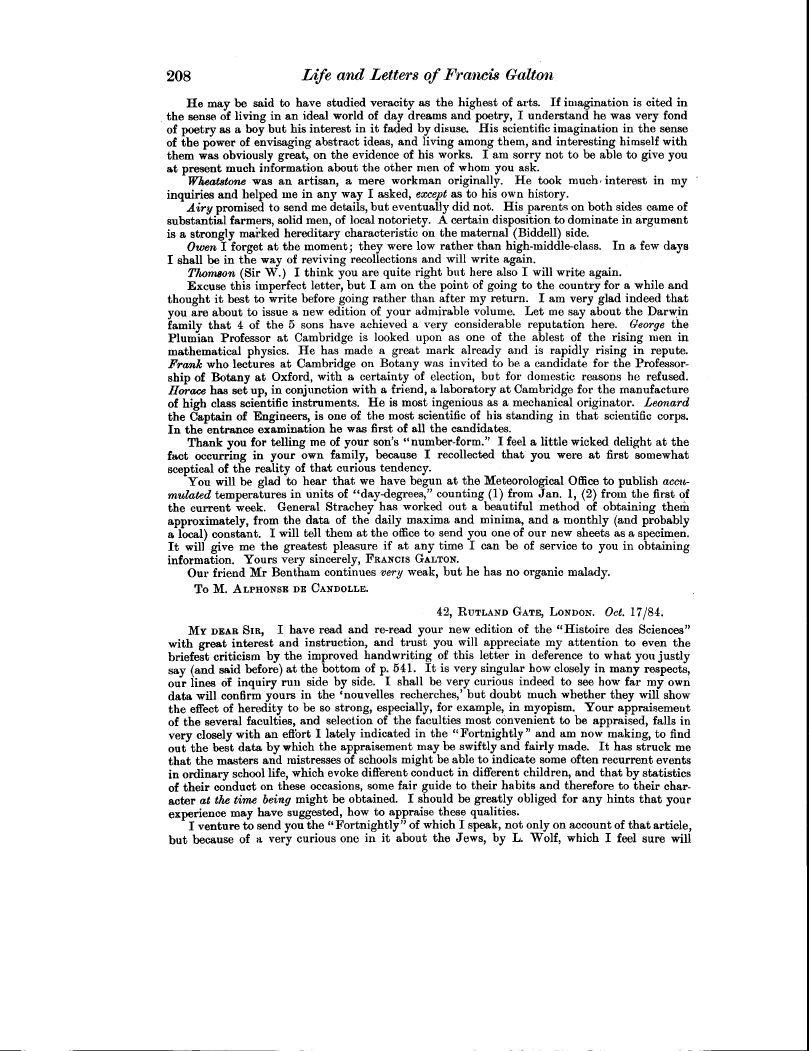208 Life and Letters of Francis Galton
He may be said to have studied veracity as the highest of arts. If imagination is cited in the sense of living in an ideal world of day dreams and poetry, I understand he was very fond of poetry as a boy but his interest in it faded by disuse. His scientific imagination in the sense of the power of envisaging abstract ideas, and living among them, and interesting himself with them was obviously great, on the evidence of his works. I am sorry not to be able to give you at present much information about the other men of whom you ask.
Wlaeatstone was an artisan, a mere workman originally. He took much- interest in my inquiries and helped me in any way I asked, except as to his own history.
Airy promised to send me details, but eventually did not. His parents on both sides came of substantial farmers, solid men, of local notoriety. A certain disposition to dominate in argument is a strongly marked hereditary characteristic on the maternal (Biddell) side.
Owen I forget at the moment; they were low rather than high-middle-class. In a few days I shall be in the way of reviving recollections and will write again.
Thomson (Sir W.) I think you are quite right but here also I will write again.
Excuse this imperfect letter, but I am on the point of going to the country for a while and thought it best to write before going rather than after my return. I am very glad indeed that you are about to issue a new edition of your admirable volume. Let me say about the Darwin family that 4 of the 5 sons have achieved a very considerable reputation here. George the Plumian Professor at Cambridge is looked upon as one of the ablest of the rising men in mathematical physics. He has made a great mark already and is rapidly rising in repute. Frank who lectures at Cambridge on Botany was invited to be a candidate for the Professorship of Botany at Oxford, with a certainty of election, but for domestic reasons he refused. Horace has set up, in conjunction with a friend, a laboratory at Cambridge for the manufacture of high class scientific instruments. He is most ingenious as a mechanical originator. Leonard the Captain of Engineers, is one of the most scientific of his standing in that scientific corps. In the entrance examination he was first of all the candidates.
Thank you for telling me of your son's "number-form." I feel a little wicked delight at the fact occurring in your own family, because I recollected that you were at first somewhat sceptical of the reality of that curious tendency.
You will be glad to hear that we have begun at the Meteorological Office to publish aceza mulcted temperatures in units of "day-degrees," counting (1) from Jan. 1, (2) from the first of the current week. General Strachey has worked out a beautiful method of obtaining them approximately, from the data of the daily maxima and minima, and a monthly (and probably a local) constant. I will tell them at the office to send you one of our new sheets as a specimen. It will give me the greatest pleasure if at any time I can be of service to you in obtaining information. Yours very sincerely, FRANCIS GALTON.
Our friend Mr Bentham continues very weak, but he has no organic malady.
To M. ALPHONSE DE CANDOLLE.
42, RUTLAND GATE, LONDON. Oct. 17/84.
MY DEAR SIR, I have read and re-read your new edition of the "Histoire des Sciences" with great interest and instruction, and trust you will appreciate my attention to even the briefest criticism by the improved handwriting of this letter in deference to what you justly say (and said before) at the bottom of p. 541. It is very singular bow closely in many respects, our lines of inquiry run side by side. I shall be very curious indeed to see how far my own data will confirm yours in the 'nouvelles recherches,' but doubt much whether they will show the effect of heredity to be so strong, especially, for example, in myopism. Your appraisement of the several faculties, and selection of the faculties most convenient to be appraised, falls in very closely with an effort I lately indicated in the "Fortnightly" and am now making, to find out the best data by which the appraisement may be swiftly and fairly made. It has struck me that the masters and mistresses of schools might be able to indicate some often recurrent events in ordinary school life, which evoke different conduct in different children, and that by statistics of their conduct on these occasions, some fair guide to their habits and therefore to their character at the time being might be obtained. I should be greatly obliged for any hints that your experience may have suggested, how to appraise these qualities.
I venture to send you the "Fortnightly" of which I speak, not only on account of that article, but because of a very curious one in it about the Jews, by L. Wolf, which I feel sure will

